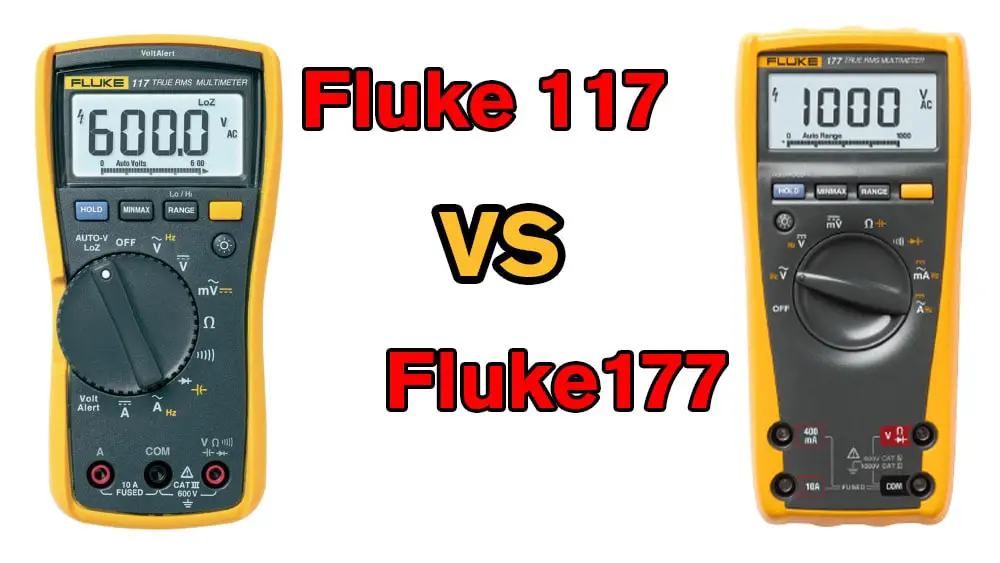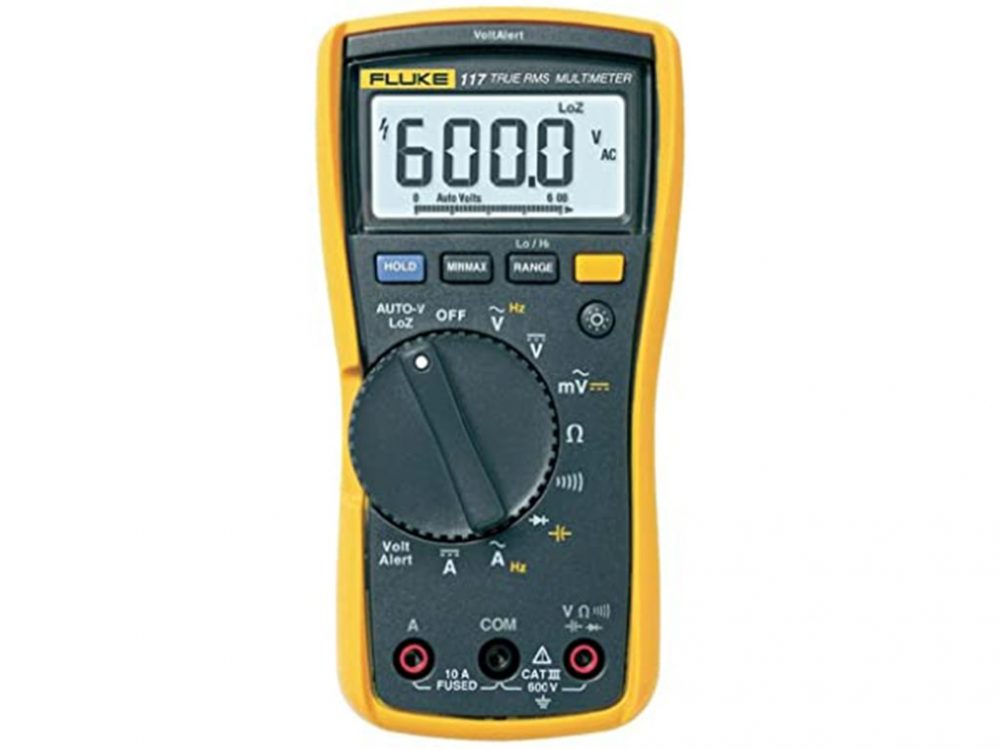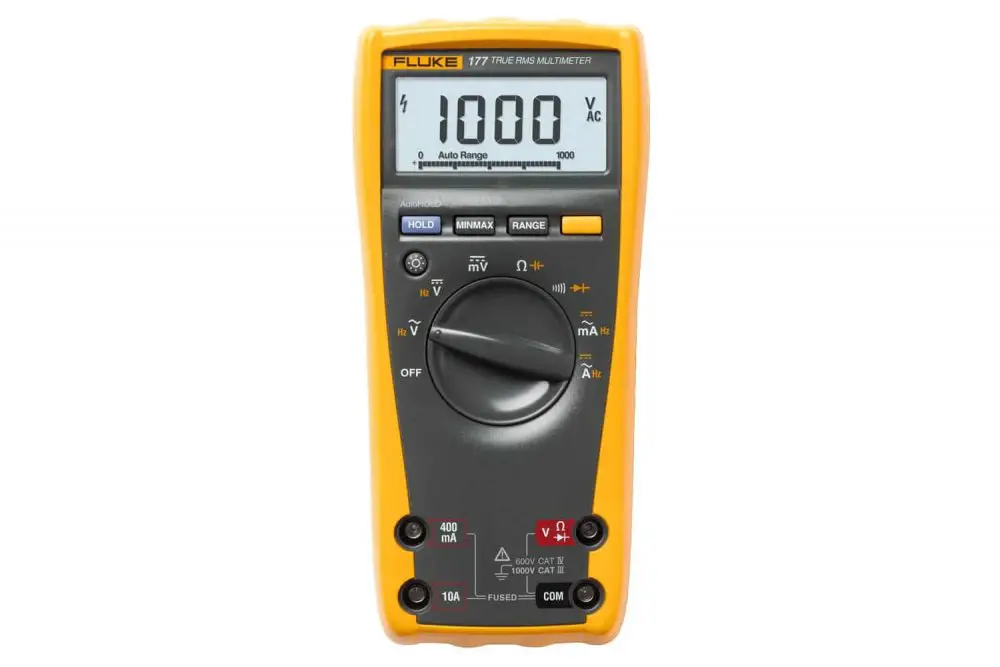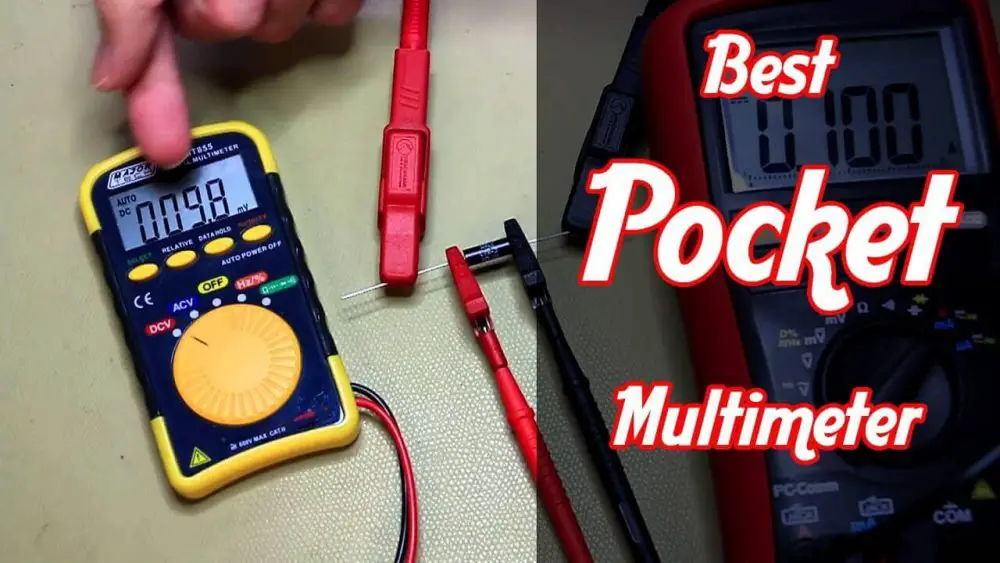Fluke 117 VS Fluke 177 Multimeter Comparison
Comparing the Fluke 117 and 177 multimeters can be tricky. On the one hand, the 117 is a true-RMS digital multimeter (DMM) while on the other hand, the 177 has additional features that make it a superior product. We’ll take a closer look at both products in this article to help you decide which one is best for you.
The first thing to consider is what you need the multimeter for. If you only need basic DMM functionality, then the Fluke 117 multimeter will suffice. However, if you need more advanced features such as temperature measurement or AC/DC current measurement, then the Fluke 177 multimeter is a better choice.
Another important consideration is accuracy. The Fluke 117 is accurate to within 3% while the Fluke 177 is accurate to within 2%. This may not seem like a big difference, but it can be crucial in some applications.
Finally, price is always a factor when choosing any product. The Fluke 117 is typically less expensive than the 177, although there are some exceptions. When deciding between these two multimeters, be sure to consider all of the factors to make sure you’re getting the best product for your needs.

Table of Contents
Differences between Fluke 117 vs Fluke 177:
When it comes to electricians, there are two main types of multimeters that they use. These are the Fluke 117 and the Fluke 177. Both of these multimeters are great for different reasons, but there are also some differences between them. Here is a comparison of the two multimeters so that you can decide which one would be the best for you to use.
The main difference between the Fluke 117 and the Fluke 177 is that the Fluke 177 has more features than the Fluke 117. For example, the Fluke 177 can measure AC/DC voltage, AC/DC current, resistance, capacitance, frequency, temperature, and duty cycle. The Fluke 117 can only measure AC/DC voltage, AC/DC current, and resistance. Another difference is that the Fluke 177 has a backlight, which makes it easier to see the screen in low-light conditions. The Fluke 117 does not have a backlight.
Another difference between the two multimeters is the price. The Fluke 177 is typically more expensive than the Fluke 117. This is because the Fluke 177 has more features than the Fluke 117. If you are looking for a more basic multimeter, then the Fluke 117 would be a good choice. However, if you are looking for a multimeter with more features, then the Fluke 177 would be a better choice.
No matter which multimeter you choose, you will be able to get accurate readings. However, if you need a multimeter with more features, then the Fluke 177 would be the better choice. If you are looking for a more basic multimeter, then the Fluke 117 would be a good choice.
- The Fluke 117 can only measure AC/DC voltage, AC/DC current, and resistance while the Fluke 177 can measure AC/DC voltage, AC/DC current, resistance, capacitance, frequency, temperature, and duty cycle.
- The Fluke 177 has a backlight while the Fluke 117 does not have a backlight.
- The Fluke 177 is typically more expensive than the Fluke 117.
- The Fluke 117 is a basic multimeter while the Fluke 177 is a multimeter with more features.
Fluke 117 vs Fluke 177 Review:
Fluke 117 Multimeter:
The Fluke 117 is a Compact True-RMS digital multimeter designed for tough jobs. It detects voltage without touching anything and can measure resistance, continuity, frequency, and capacitance. Furthermore, the 117 has an auto AC/DC function that switches between measuring AC and DC voltage based on the input signal. Furthermore, the multimeter has a large backlit display for easy reading in low-light conditions.

The Fluke 117 is an excellent digital multimeter that can be used both at home and in the workplace. Simple to use and produces accurate results. It is also very useful to be able to detect voltage without touching it. Fluke 117 can be used to troubleshoot electrical circuits, inspect HVAC systems, and perform other tasks.
Key Features:
- Auto-ranging for ±3% accuracy
- True RMS voltage and current for accurate measurements on non-linear loads
- 6000 count LCD resolution with backlight for clear readings in any lighting conditions
- MIN/MAX/AVG Recording to capture variations over time
- Frequency, capacitance, and resistance measurements for comprehensive troubleshooting
- CAT III 600 volt safety rating for peace of mind when working in high voltage environments
- IP67 waterproof and dustproof rating for use in harsh conditions
- Built-in temperature measurement function for HVAC applications
- Compatible with optional accessories such as iFlex flexible current probe and ReView PC software
- 3-year warranty for long-term peace of mind
Pros:
- Easy to use
- Accurate readings
- Durable
- Non-contact voltage detection function is useful
Cons:
- There is no built-in thermometer.
Fluke 177 Multimeter
The Fluke 177 True-RMS Digital Multimeter (DMM) is an advanced measuring tool used to diagnose and repair electrical and electronic systems. This multimeter is loaded with features that make it easy to use and accurate. The large backlit display is easy to read in all lighting conditions, and the built-in basic arithmetic functions allow you to perform calculations based on the measurements you take.

The Fluke 177 multimeter has a low-battery indicator that alerts you when the batteries need to be replaced. The Fluke 177 is an excellent choice for any technician or engineer looking for a dependable and precise multimeter. It has many features that will make your job easier.
Key Features:
- AC/DC voltage and current measurements: The fluke 177 can measure both AC and DC voltage, as well as DC current. This makes it a versatile tool for troubleshooting both types of electrical circuits.
- Resistance measurements: The fluke 177 can measure resistance in electrical circuits, which is useful for troubleshooting issues.
- Continuity test: The continuity test feature of the fluke 177 multimeter allows you to quickly check for breaks or shorts in electrical circuits.
- Diode test: The diode test feature allows you to check the functionality of diodes in electrical circuits.
- Temperature measurement: The fluke 177 multimeter can also be used to measure temperature, making it a versatile tool for many applications.
- Data hold: The data hold feature allows you to freeze the display on the multimeter so that you can take a reading without having to continuously hold the button down.
- Backlight: The backlight on the fluke 177 multimeter makes it easy to read the display in low-light conditions.
- Auto power off: The auto power-off feature conserves battery life by shutting off the multimeter when it is not in use.
- Low battery indicator: The low battery indicator lets you know when the batteries in the multimeter need to be replaced.
- Cat III 600 V safety rating: The fluke 177 multimeter has a Cat III 600 V safety rating, meaning it is safe to use on circuits up to 600 volts.
Pros
- Reliable and rugged construction
- Easy to read in any lighting conditions
- A versatile tool for troubleshooting and maintenance tasks
- Reliable and rugged construction
- It is easy to read in any lighting conditions
- A versatile tool for troubleshooting and maintenance tasks
Cons
- Not able to measure in micro-amps
Frequently Asked Questions:
Yes, the Fluke 117 can measure microamps. It is a True RMS multimeter that can measure AC and DC voltage, AC and DC current, resistance, continuity, and capacitance. It also has a backlit display for easy reading in low-light conditions.
As an electrician, you will frequently be required to measure AC voltage and current. You will need a multimeter that can accurately measure AC values for these purposes. True RMS multimeters and average responding multimeters are the two types of multimeters available on the market for measuring AC values.
When measuring AC voltage and current, true RMS multimeters are generally more accurate than average responding multimeters. This is because true RMS multimeters consider the waveform of the AC signal, whereas average responding multimeters simply take the signal’s average value. However, in some cases, an average responding multimeter may be more accurate than a true RMS multimeter.
An average responding multimeter, for example, maybe more accurate if the AC signal is not a pure sine wave (as when measuring the output of a rectifier). A true RMS multimeter, on the other hand, is usually the best choice for measuring AC voltage and current. So, if you’re in the market for a new multimeter, look for one that can take true RMS measurements.
Both brands offer high-quality products that are known for being durable and reliable. However, there are some differences between the two brands. Fluke products are typically made with higher-quality materials and components, which makes them more durable. Additionally, Fluke products often come with better warranties than Klein products. This makes them a more expensive option, but also a more reliable one. On the other hand, Klein products are typically more affordable than Fluke products. This makes them a good option for budget-conscious consumers.
Additionally, Klein products often come with shorter warranties than Fluke products. However, this is to be expected given the difference in prices between the two brands. Ultimately, the decision of which brand to choose is up to you and your needs. If you are looking for a high-quality product that is built to last, Fluke is a good option. However, if you are looking for a more affordable option, Klein is a good choice.
Conclusion:
The Fluke 117 is better for simple tasks, whereas the Fluke 177 is more versatile. If you don’t require all of the Fluke 177’s features or are on a tight budget, the Fluke 117 is a good option. The Fluke 177 is a better choice if you require more features or want a more powerful tool.
If you only need a multimeter for simple tasks, the Fluke 117 is a good choice. It’s less expensive but still does the job. If you want a multimeter with more features or higher quality, the Fluke 177 is a good option. It’s a little more expensive, but it’s worth it if you need the extra features.



